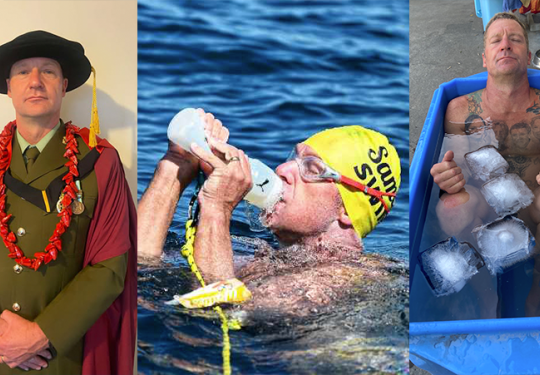Beneath the surface
Major Dave Edgar’s journey of resilience, acceptance, failure and success has taken plenty of twists and turns, and his latest is an epic swim to claim New Zealand’s Triple Crown.
05 February, 2025
It’s a feat that only around a dozen people have ever ticked off - New Zealand’s open water swimming ”Triple Crown”.
By the end of this week, it’s a list that the New Zealand Army’s Major Dave Edgar is hoping to add his name to.
Having already swam the length of Lake Taupō and crossed the Cook Strait in 2023, the last hurdle between him and the famed Triple Crown is the 28km point-to-point stretch of water between Stewart Island and Bluff on the bottom of the South Island – the Foveaux Strait.
With wild conditions, freezing temperatures and the almost inevitable presence of sharks, it’s not a swim for the faint hearted.
But then again, Major Edgar isn’t your run-of-the-mill swimmer.
In his own words, Major Edgar tells us about how life in a bush gang, a military, academic and rugby career overseas shaped him.
Tokaroa roots
I’m a Tokoroa boy, through and through.
It’s a Waikato township that lies in the heart of the Rotorua, Waitomo and Taupō tourist triangle.
Its population of about 14,000 people is large enough to be one of the biggest around, but small enough to be the kind of place where you grow up surrounded by your village. Everyone knows everyone.
I grew up there as part of a big Catholic family, where I was one of five siblings. Three brothers and a sister, with me in the middle.
Through Tokoroa Intermediate and Tokoroa High School I found my feet in the world, and am proud to call it home.
It's also the type of place that teaches you to stand on your own two feet.
I grew up at a time and in a place where gangs were part of the fabric around me. After I left school, I joined a bush gang myself, and thought that was my lot.
Born and bred with some pretty hardcore gangsters.
But I just knew deep down that I could achieve more.
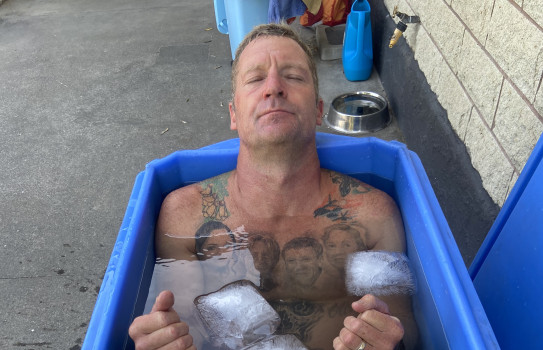
I’ve always had a hell of a ticker and pretty early on I knew endurance sport was my thing.
I’d end up representing New Zealand at five Triathlon World Championships, and spent a few years on the scene semi-professionally, but quickly found the longer distances of Iron Man were my forte.
I could just keep going and going where others would fall off.
But still, I wanted more.
So at 22 years of age, I signed up for the Army.
I was a bit older than most when I joined, where I posted as a steward down south at Burnham Military Camp, with the aim of becoming a Physical Training Instructor (PTI).
As soon as the opportunity came around I signed up for PTI selection. I was one of the fittest in my group, so I felt pretty confident of my chances.
I didn’t get selected, and made plans to leave the Army not long after.
Now that time has passed, I look back at that initial rejection in a really interesting light. It probably served as a positive for me, because it put me on a really clear trajectory.
I wasn’t going to let somebody else define what I was or wasn’t good enough to do.
The universe has a funny way of coming full circle - nearly thirty years later, I’m now the Officer Commanding of the Physical Performance Squadron, and I’m living proof that everybody’s journey takes its own path.
Once I was out, I headed south to go and study a physical education degree at Otago University.
I also got the chance to experience working with the University rugby team and later Otago Rugby. Little did I know then what doors that would open for me.
I was nearly 30 by the time I got my first full-time rugby gig. I linked up with Nick Gill – who’s now the head trainer for the All Blacks – at Waikato, and spent five years working with the Chiefs.
A three-year stint with Samoa’s national team followed before I got a phone call offering me the chance to go to Japan, where I’d rub shoulders with the likes of former Japan, Australia and England head coach Eddie Jones.
I learned so much about how top coaches and players chased success, and how that same success may not carry through their careers.
Working alongside Eddie, or even then-Chiefs coach Warren Gatland, I learned that you’ve got to be willing to adapt and change the way you go about your work and chasing success, and those two are the kind of guys who would never leave a stone unturned.
Closer to home, I’ve been fortunate to work alongside Tom Coventry - who’s now with Moana Pasifika – and one of the best guys I’ve worked with.
He’s a prime example of what being a good bastard is all about. Someone who’s been level-footed all the way through his career.
That grounding is something I always try and bring to every job and role I take on.
Through Defence Rugby links, I once again came knocking on the Army door in 2016, where I fit back into the human performance cell within the Joint Support Group – a unit where I could see myself adding real value with my background.
What I didn’t anticipate was how a step back into uniform life would in fact be the launch pad for a second academic career.
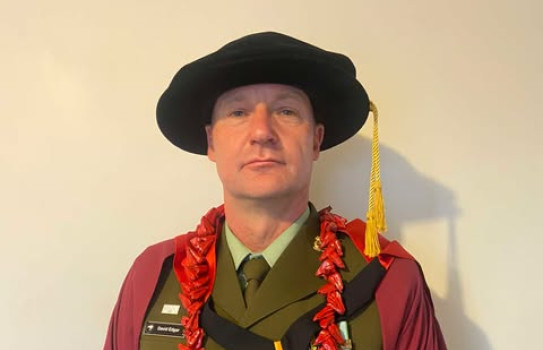
Dyslexia
I have dyslexia.
Or at the very least, I’m pretty bloody confident I’ve got it without being officially diagnosed.
Everyone I've spoken to about it - my school teachers, my mates, my parents – all say it made perfect sense.
There were things that other kids did at school that just didn’t click the same way for me, and when you’re young that can be really tough.
I got used to being knocked back a lot or failing. So I just found another way. To me, it was just normal.
What I eventually realised was that for any weakness there also comes a strength – and for me that was in my tenacity, my doggedness, my ability to form relationships and my inner ticker that told me to never stop.
When I was back in the Army I had the opportunity to undertake a doctorate – a chance at being a legit scholar.
Many of my peers may have only needed to read a research paper or an article once or twice before it sticks in their brains, whereas I found I might have to read the same piece three, four, five times just for it to sink in – so it took me a shitload more time to get through some things, but in my mind, it made the end result even sweeter.
I earned it.
I remember one of my supervisors saying “far out, you just keep coming back”. In some ways, I didn’t get it, isn't that what you're supposed to do?
The same went for my rugby career.
You go to a place like Samoa where you're the palagi - the outsider - and you've got to find a way to survive and make a difference in a whole other culture, or to overcome a language barrier, to leave a lasting impact on a group of people, or a club where the culture demands nothing but the best.
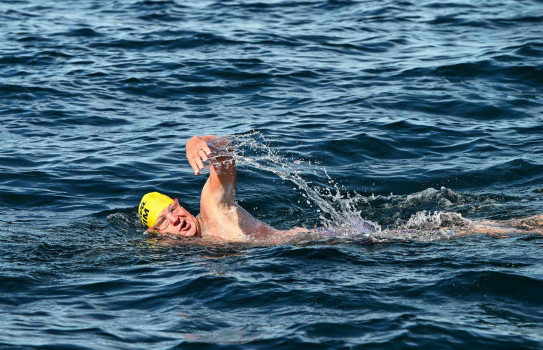
Just keep swimming
Despite a few injuries and surgeries along the journey, one thing I’ve never lost is the endurance bug.
People ask me why I swim, and it’s pretty simple - I love the challenge.
I love pushing myself into a new world and into a place that I didn’t know my body could go.
Being a good Kiwi, one of the first real challenges I’d set my sights on was to complete the New Zealand open water swimming ‘Triple Crown’.
It’s made up of three events; swimming the length of Lake Taupō, crossing the Cook Strait and the Foveaux Strait.
I’ve ticked off the first two in 2019 (Taupō) and 2024 (Cook Strait) and this week I’m hoping to tick off the final one - Foveaux.
Records are pretty scant, but there’s only around a dozen people who we know have completed all three, so it’s a pretty prestigious benchmark, particularly for us Kiwis.
The Foveaux’s definitely the odd one out. It’s wild, more rugged and untouched, which is part of the appeal.
Unlike the others, there’s no charter companies set up to support you on the swim, so I’ve had to organise all the logistics myself – an area where an Army career certainly helped.
My captain, Rewi Bull, is a crayfisherman who knows Fiordland as well as anyone, and then I’ve got a support crew on a second boat.
Having everyone on the same page is crucial. I need absolute faith in each and every one of them, that they know exactly what I need and when.
I’m literally putting my life in their hands, so there’s no room to get the preparation wrong.
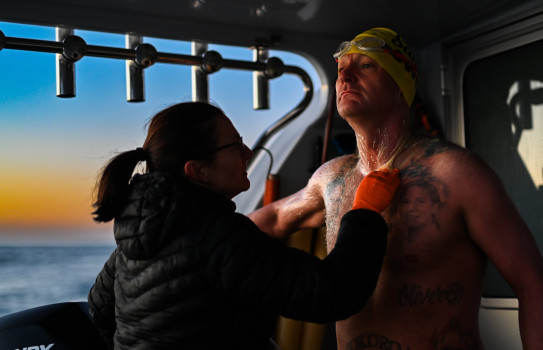
Mind the sharks
Sharks.
I’ve been told by other swimmers that they’re definitely there, cruising the cool waters of the Foveaux, and I’m prepared for one to take an interest in seeing a human pop up in their environment. It’s not something they see every day!
Sure, it’s probably going to give you the shits if you see a big shadow swim past you, but I trust the fact that I’m a researcher at heart.
The stats tell me I have more chance of being hit by a car on the crossing outside of work than I do of being a shark snack.
Obviously it’s something we take extremely seriously - we make sure we’re swimming at the right time of year, we’re looking at particular hot pots to avoid, and we’ll have shark deterrents on the boat and one on my ankle.
We actually had a curious shark come check me out on the Cook Strait last year.
I remember the crew calling me over to swim near the boat for a short while before sending me back out. Afterwards they told me it was “100% a Mako” that had come in for a closer look, but had turned away as soon as it hit the deterrent perimeter.
So that’s assurance for my wife and my crew to put them at ease, but me, I’m not too bothered.
If the sharks are a possibility, then what is a guarantee is cold water.
No matter how much physical training you do ahead of time, there’s no amount of strength or cardio that can prepare you for just how cold it is.
When you hit that water, it literally takes your breath away.
I don’t have a wetsuit – it’s just me in my togs, goggles and cap, and maybe some grease on my skin.
I’ve done a heck of a lot of cold water training leading up to this challenge, whether it’s ice baths at the New Zealand Campus of Innovation and Sport, or swimming in the Wairau river every day I’m home in Blenheim.
Wind, rain or shine. Summer or winter. 16 degrees or six degrees. No excuses.
I’m lucky that I’ve got a dog who’s as adventurous as me, so I’ve always got a pal in the water.
There will inevitably come a point in a 25/30/45km swim where you get pretty sore, especially with all the smaller muscles in your back and shoulders - you might be out there for up to 14, 15 hours at a time.
Sometimes, there’s nothing else than to muscle it out - there’s no shortcuts when you’re faced 20 kilometres of open ocean – and so digging deep, and leaning on my years of Army training, becomes the way through.
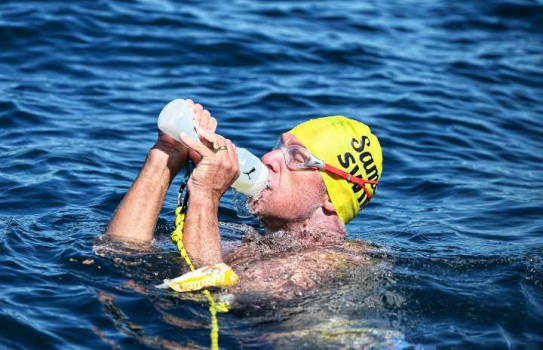
Awareness
Whilst I love the challenge, the reason why I swim is also about much more than just me.
The last few swims I’ve done, I’ve tried to raise awareness and money towards organisations helping our youth who have dyslexia.
I count myself lucky to have reached a point in my life where I’m comfortable in my own skin, but I know there are others – younger versions of myself – who are still on that journey.
One of the best bits of advice I can pass on from my own experience is to not be afraid to fail.
I would have never had my career – from endurance sport to the military, rugby gigs and doctorates - had I been scared of failure.
So don't be don't embarrassed of it. It's who you are. It’s who I am.
But damned I’ll be if anybody were to tell me I can’t do something because I’m a bad speller or a bad reader.
And I’ll keep proving that point, one stroke at a time.
MAJ Dave Edgar will be taking on the Foveaux Strait this Friday, 7 March 2025.
To follow his journey, keep a look out on his Facebook page, where his team will be updating his effort throughout the day.
And for more on Dave’s story, and to find out more information about his dyslexia awareness campaign, visit his website here.
